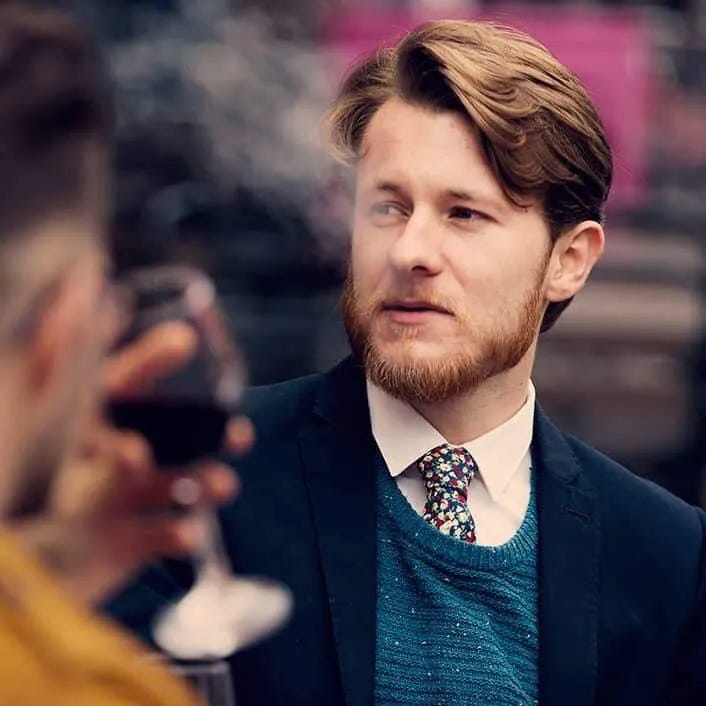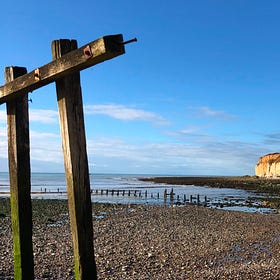Meet the Poets: Thomas Stewart
Thomas speaks to us about the genesis of his two Issue Three poems, his poetic influences, his writing practice, and what first drew him to poetry
What can you tell us about your two Issue Three poems?
Both of these poems came from my desire to explore and retell the Welsh myth of Gelert and Llywelyn. Long story short — a prince, Llywelyn, loves his dog Gelert. One day, Llywelyn thinks Gelert has killed his child, so he kills Gelert. He is wrong. Gelert was only protecting the child. This story was told to me when I was at school by my teacher and it fascinated me — the relationship with the dog, the bloody scene in the nursery and the way Llywelyn was so quick to believe the worst in his friend. I set out to write about this and thought about bell hooks’ quote: ‘The first act of violence that patriarchy demands of males is not violence towards women. Instead, patriarchy demands of all males that they engage in acts of psychic self-mutilation, that they kill off the emotional parts of themselves.’ So, this was my focus. I was thinking of Llywelyn as going through the stages of psychic self-mutilation, killing off his emotional self due to becoming the King of Wales (a fantasy I wanted to indulge as we never had this in history).
This story was told to me when I was at school by my teacher and it fascinated me — the relationship with the dog, the bloody scene in the nursery and the way Llywelyn was so quick to believe the worst in his friend
By the time we meet Llywelyn in these poems, he has changed. In Deganwy Castle — a poem I wrote when I was in Berlin — he is reflecting on a time when he was innocent but used violence to communicate his strength to other boys. It is a mirror for the man he is now, destroying castles and homes because he believes that is power. And of course it is not. This is why he meets Cythraul in the next poem. He has become a tyrant, and all tyrants meet their ends. Cythraul is the Welsh word for Satan or Devil. Llywelyn’s self-mutilation has led him to this and who is waiting for him? Who is the person he really wants to see? Gelert. The best friend he killed. Llywelyn’s tale was always told to me as a tragedy, so I wanted to expand on that and give it a modern lens. To see Llywelyn as the kind of man who kills the only person who could have saved him.
Llywelyn’s tale was always told to me as a tragedy, so I wanted to expand on that and give it a modern lens. To see Llywelyn as the kind of man who kills the only person who could have saved him.
What poets and poems are you in dialogue with?
Lucille Clifton is my guiding light, my joy and my inspiration. Her range, skill and storytelling abilities are just perfection. I always go back to her poems about the Bible and the angel reporting on Adam and Eve; sublime. Eileen Myles is another that frees me from the shackles of rules and just tells me to write. The phenomenal Louise Glück, such wondrous precision of words and thoughts. I’m very much a product of the authors I love and when I’m writing poetry, I am constantly reading it, I’m insatiable. I was fortunate enough to be at a writing residency at Moniack Mhor when I was working on most of these poems (as I’m hoping this will be my second book) and I devoured their poetry library. It’s like a beat that needs to keep moving in my head and that can only happen with others’ words.
I’m very much a product of the authors I love and when I’m writing poetry, I am constantly reading it, I’m insatiable
What is your writing practice? Where and when do you write? By hand, laptop, phone notes…?
I work full-time as a language teacher, so I work at night. After dinner and some film or TV time, my partner goes to bed, and I go to the laptop for a few hours. If I’m writing poetry, I start with a pen and paper, I can scribble in the margins, move lines around, hash out ideas. Sometimes it comes, sometimes it doesn’t, and I need to come back to it. I’m a big believer in not forcing it but also being disciplined — it’s a fine middle line to strike, knowing when to walk away, knowing when to stay and push on. I’ll type the poem up when it’s somewhat finished on the page and by typing I am putting it through its first draft. Some poems take about thirteen drafts, others just come as they are. I struggled a lot with Deganwy Castle but when I realised the shape of the poem, it fell into place. Shape is really important to me. I don’t really know why but I need to understand the arch of the poem, the way the lines sit together, how it looks. Cythraul was the opposite. I knew its shape, I knew its message and it just burst out of me. My beautiful, dead, tyrant shouting for his best friend.
If I’m writing poetry, I start with a pen and paper, I can scribble in the margins, move lines around, hash out ideas. Sometimes it comes, sometimes it doesn’t
What drew you to writing poetry?
Philip Gross. When I was at the University of South Wales (what was known as the University of Glamorgan when I was there), Philip ran a Children’s Writing course which I took. Part of that was writing poetry which I decided to have a go at. I’d not written poetry before. I’d been writing short stories and novels throughout my teens but was scared of poetry due to its rules. It was Philip and another tutor, Barrie Llywelyn, who taught me to throw the rules out and just write. I’ve written about the elitism of poetry, the way it can alienate instead of attract but as I’ve experienced more poetry — especially modern poetry — I have realised it is a vessel to communicate anything we want. It can be free of form but also adhere to a form. Its strength is its creation and obliteration of rules.
What’s on your bedside table? Books etc.?
I always have way too many books on my to-read pile, but this brings me joy as I never know what mood I’m going to be in. I’ve just finished Boy Parts by Eliza Clark which was gnarly and wonderful. Also The Difficult Ghost by Leila Guerriero, a story of how Truman Capote wrote In Cold Blood. I’m reading a lot of fiction at the moment, as that’s what I’m primarily writing, although I may have just started a new poetry project, we shall see. I have Christos Tsiolkas’ The In-Between (I love Tsiolkas’ style of writing). Galatea 2.2 by Richard Powers. Her Majesty’s Royal Coven by Juno Dawson. The Book That Wouldn’t Burn by Mark Lawrence. The Italian by Ann Radcliff. The War Between the Tates by Alison Lurie. Bunny by Mona Awad. Hour of the Star by Clarice Lispector which was a gift from one of my students. Marlon James’ Black Leopard Red Wolf. In terms of poetry, I have Danez Smith’s Bluff (Smith is one of my favourite living poets) and Diane Seuss’ Modern Poetry (excited for that as I thought frank: sonnets was a thing of genius). Oh, and a biography of Stanley Kubrick.







An enjoyable read, thank you.
I really enjoyed reading that. Fascinating.